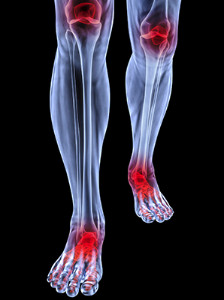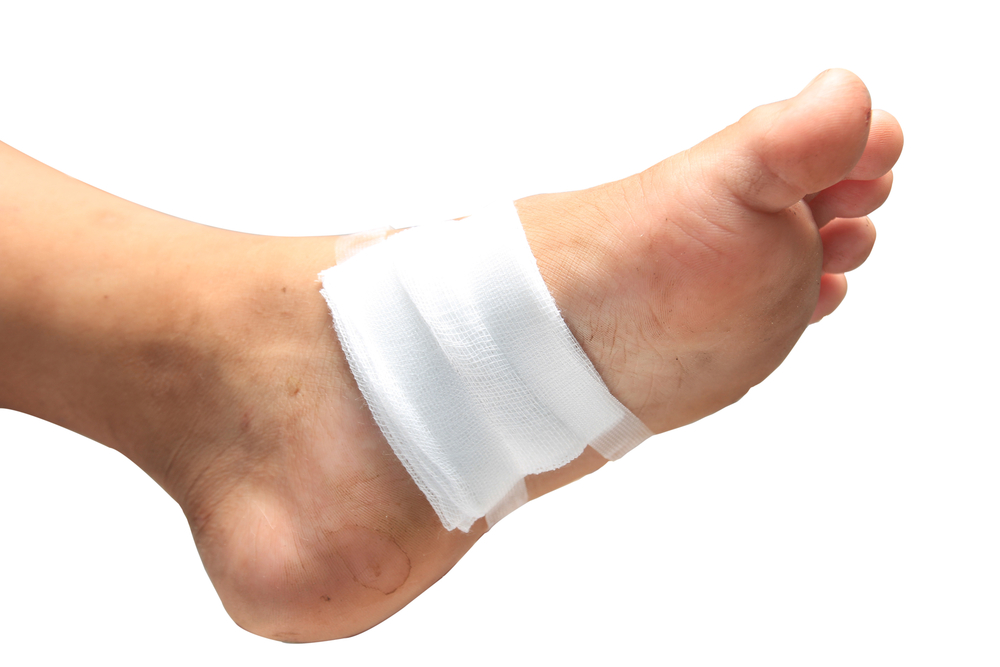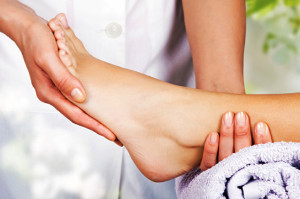





 Rheumatoid Arthritis occurs when the immune system attacks the joints and causes pain and inflammation. Symptoms of RA tend to come and go, and you may have flare-ups when your symptoms are worse than usual. People with this condition commonly experience symptoms in their feet. The main symptom of RA is joint pain. This pain is typically described as a “throbbing” or “aching” sensation that is worse in the mornings or after a period of inactivity. Another common sign is joint stiffness that makes moving your joints difficult. This stiffness may occur in the morning, but if it occurs longer than a half hour, you should see your podiatrist immediately.
Rheumatoid Arthritis occurs when the immune system attacks the joints and causes pain and inflammation. Symptoms of RA tend to come and go, and you may have flare-ups when your symptoms are worse than usual. People with this condition commonly experience symptoms in their feet. The main symptom of RA is joint pain. This pain is typically described as a “throbbing” or “aching” sensation that is worse in the mornings or after a period of inactivity. Another common sign is joint stiffness that makes moving your joints difficult. This stiffness may occur in the morning, but if it occurs longer than a half hour, you should see your podiatrist immediately.
Because RA affects more than just your joints, including the joints in your feet and ankles, it is important to seek early diagnosis from your podiatrist if you feel like the pain in your feet might be caused by RA. For more information, contact one of our podiatrists of Active Foot and Ankle Care, LLC. Our doctors will assist you with all of your podiatric concerns.
What Is Rheumatoid Arthritis?
Rheumatoid Arthritis (RA) is an autoimmune disorder in which the body’s own immune system attacks the membranes surrounding the joints. Inflammation of the lining and eventually the destruction of the joint’s cartilage and bone occur, causing severe pain and immobility.
Rheumatoid Arthritis of the Feet
Although RA usually attacks multiple bones and joints throughout the entire body, almost 90 percent of cases result in pain in the foot or ankle area.
Symptoms
Diagnosis
Quick diagnosis of RA in the feet is important so that the podiatrist can treat the area effectively. Your doctor will ask you about your medical history, occupation, and lifestyle to determine the origin of the condition. Rheumatoid Factor tests help to determine if someone is affected by the disease.
If you have any questions please feel free to contact our offices located in Fair Lawn, Riverdale, and Englewood, NJ . We offer the newest diagnostic and treatment technologies for all your foot and ankle needs.
 If you have developed the condition known as diabetes, you may be susceptible to wounds that form on the feet. Abnormally high glucose levels may cause difficulty in healing, in addition to possibly causing poor circulation. This may lead to neuropathy, and these damaged nerves may cause a loss of feeling in the feet. If this should occur, the patient may be unable to determine the severity of any wounds that appear on the feet and may often go unnoticed. Ingrown toenails may lead to wounds on the feet as a result of the skin and surrounding area breaking down. There are several symptoms of diabetic wounds, including tenderness, inflammation, or a discharge coming from the affected area. It’s suggested to consult with a podiatrist who can properly assist you regarding any wounds on the feet.
If you have developed the condition known as diabetes, you may be susceptible to wounds that form on the feet. Abnormally high glucose levels may cause difficulty in healing, in addition to possibly causing poor circulation. This may lead to neuropathy, and these damaged nerves may cause a loss of feeling in the feet. If this should occur, the patient may be unable to determine the severity of any wounds that appear on the feet and may often go unnoticed. Ingrown toenails may lead to wounds on the feet as a result of the skin and surrounding area breaking down. There are several symptoms of diabetic wounds, including tenderness, inflammation, or a discharge coming from the affected area. It’s suggested to consult with a podiatrist who can properly assist you regarding any wounds on the feet.
Wound care is an important part in dealing with diabetes. If you have diabetes and a foot wound or would like more information about wound care for diabetics, consult with one of our podiatrists from Active Foot and Ankle Care, LLC. Our doctors will assess your condition and provide you with quality foot and ankle treatment.
What Is Wound Care?
Wound care is the practice of taking proper care of a wound. This can range from the smallest to the largest of wounds. While everyone can benefit from proper wound care, it is much more important for diabetics. Diabetics often suffer from poor blood circulation which causes wounds to heal much slower than they would in a non-diabetic.
What Is the Importance of Wound Care?
While it may not seem apparent with small ulcers on the foot, for diabetics, any size ulcer can become infected. Diabetics often also suffer from neuropathy, or nerve loss. This means they might not even feel when they have an ulcer on their foot. If the wound becomes severely infected, amputation may be necessary. Therefore, it is of the upmost importance to properly care for any and all foot wounds.
How to Care for Wounds
The best way to care for foot wounds is to prevent them. For diabetics, this means daily inspections of the feet for any signs of abnormalities or ulcers. It is also recommended to see a podiatrist several times a year for a foot inspection. If you do have an ulcer, run the wound under water to clear dirt from the wound; then apply antibiotic ointment to the wound and cover with a bandage. Bandages should be changed daily and keeping pressure off the wound is smart. It is advised to see a podiatrist, who can keep an eye on it.
If you have any questions, please feel free to contact our offices located in Fair Lawn, Riverdale, and Englewood, NJ . We offer the newest diagnostic and treatment technologies for all your foot care needs.
 A young woman recently noticed that her toenails were slipping off her toes. She was able to find out that the reason this occurred was because of a fish pedicure she received months prior. Fish pedicures are done by placing the feet in a tub of water containing small fish called Garra rufa. These fish nibble away at calluses and rough cuticles on the skin. Unfortunately for the young women, this pedicure gave her a condition called onychomadesis. Onychomadesis is a condition that causes the nails to begin shedding. This is the first time that a fish pedicure has been found to cause onychomadesis. There are other safety hazards that have been linked to these pedicures, and many of them involve the transmission of infection.
A young woman recently noticed that her toenails were slipping off her toes. She was able to find out that the reason this occurred was because of a fish pedicure she received months prior. Fish pedicures are done by placing the feet in a tub of water containing small fish called Garra rufa. These fish nibble away at calluses and rough cuticles on the skin. Unfortunately for the young women, this pedicure gave her a condition called onychomadesis. Onychomadesis is a condition that causes the nails to begin shedding. This is the first time that a fish pedicure has been found to cause onychomadesis. There are other safety hazards that have been linked to these pedicures, and many of them involve the transmission of infection.
For more information about treatment, contact one of our podiatrists of Active Foot and Ankle Care, LLC. Our doctors can provide the care you need to keep you pain-free and on your feet.
Toenail Fungus Treatment
Toenail fungus is a condition that affects many people and can be especially hard to get rid of. Fortunately, there are several methods to go about treating and avoiding it.
Antifungals & Deterrence
Oral antifungal medicine has been shown to be effective in many cases. It is important to consult with a podiatrist to determine the proper regiment for you, or potentially explore other options.
Applying foot powder on the feet and shoes helps keep the feet free of moisture and sweat.
Sandals or open toed shoes – Wearing these will allow air movement and help keep feet dry. They also expose your feet to light, which fungus cannot tolerate. Socks with moisture wicking material also help as well.
If you have any questions please feel free to contact our offices located in Fair Lawn, Riverdale, and Englewood, NJ . We offer the newest diagnostic tools and technology to treat your foot and ankle needs.
 Ingrown toenails are a common condition that often produces easily identifiable symptoms. These may include the skin becoming red as a result of the corner of the nail growing into it, in addition to a discharge oozing from the nail. General causes for this condition may be from cutting the toenails improperly, wearing shoes that fit poorly, or suffering an injury like stubbing your toe. If this ailment is not treated in a timely fashion, a serious infection may develop, potentially requiring prolonged medical attention from a podiatrist. It’s suggested to schedule a consultation as quickly as possible for the discussion of proper treatment options, so as to avoid exacerbating the condition.
Ingrown toenails are a common condition that often produces easily identifiable symptoms. These may include the skin becoming red as a result of the corner of the nail growing into it, in addition to a discharge oozing from the nail. General causes for this condition may be from cutting the toenails improperly, wearing shoes that fit poorly, or suffering an injury like stubbing your toe. If this ailment is not treated in a timely fashion, a serious infection may develop, potentially requiring prolonged medical attention from a podiatrist. It’s suggested to schedule a consultation as quickly as possible for the discussion of proper treatment options, so as to avoid exacerbating the condition.
Ingrown toenails can become painful if they are not treated properly. For more information about ingrown toenails, contact one of our podiatrists of Active Foot and Ankle Care, LLC. Our doctors can provide the care you need to keep you pain-free and on your feet.
Ingrown Toenails
Ingrown toenails occur when a toenail grows sideways into the bed of the nail, causing pain, swelling, and possibly infection.
Causes
Prevention
Because ingrown toenails are not something found outside of shoe-wearing cultures, going barefoot as often as possible will decrease the likeliness of developing ingrown toenails. Wearing proper fitting shoes and using proper cutting techniques will also help decrease your risk of developing ingrown toenails.
Treatment
Ingrown toenails are a very treatable foot condition. In minor cases, soaking the affected area in salt or antibacterial soaps will not only help with the ingrown nail itself, but also help prevent any infections from occurring. In more severe cases, surgery is an option. In either case, speaking to your podiatrist about this condition will help you get a better understanding of specific treatment options that are right for you.
If you have any questions please feel free to contact our offices located in Fair Lawn, Riverdale, and Englewood, NJ . We offer the newest diagnostic and treatment technologies for all your foot and ankle needs.
Read more about Ingrown Toenail Care It’s common for most women to experience swollen feet during their pregnancy. It’s considered normal for both feet to be affected, but your doctor should be contacted promptly if only one foot is swollen. There are several effective ways that may aid in reducing a portion of the swelling. These may include elevating your feet and legs frequently during the day, preferably above heart level. Additionally, performing foot and ankle stretches may help to pump excess fluid from the feet and legs. Many women have found that wearing compression stockings may help swollen feet from becoming worse during the day. Research has shown that limiting salt intake and drinking plenty of fresh water frequently may aid in the reduction of excess fluid, which often contributes to swollen feet during pregnancy.
It’s common for most women to experience swollen feet during their pregnancy. It’s considered normal for both feet to be affected, but your doctor should be contacted promptly if only one foot is swollen. There are several effective ways that may aid in reducing a portion of the swelling. These may include elevating your feet and legs frequently during the day, preferably above heart level. Additionally, performing foot and ankle stretches may help to pump excess fluid from the feet and legs. Many women have found that wearing compression stockings may help swollen feet from becoming worse during the day. Research has shown that limiting salt intake and drinking plenty of fresh water frequently may aid in the reduction of excess fluid, which often contributes to swollen feet during pregnancy.
Pregnant women with swollen feet can be treated with a variety of different methods that are readily available. For more information about other cures for swollen feet during pregnancy, consult with one of our podiatrists from Active Foot and Ankle Care, LLC. Our doctors will attend to all of your foot and ankle needs.
What Foot Problems Can Arise During Pregnancy?
One problem that can occur is overpronation, which occurs when the arch of the foot flattens and tends to roll inward. This can cause pain and discomfort in your heels while you’re walking or even just standing up, trying to support your baby.
Another problem is edema, or swelling in the extremities. This often affects the feet during pregnancy but tends to occur in the later stages.
How Can I Keep My Feet Healthy During Pregnancy?
If you have any questions please feel free to contact our offices located in Fair Lawn, Riverdale, and Englewood, NJ . We offer the newest diagnostic and treatment technologies for all your foot and ankle needs.
Read more about Pregnancy and Foot Health





